Colloquium for Global Iran Studies
The Colloquium for Global Iran Studies (CoGIS) provides an interdisciplinary forum for scholars, intellectuals, artists, public figures, faculty, and students committed to deepening our knowledge and understanding of modern Iran in its global, regional, and historical contexts. Through a series of roundtables, public lectures, and events, as well as a sustained research and writing group, CoGIS supports the Northwestern community to consider the productivity of a global framework in the study of Iran and its diverse diasporas and peoples. CoGIS sets out to build the analytical and pedagogical tools necessary to un-learn persistent misconceptions and prevalent oversimplifications that explain away modern Iran and its diasporas and learn from those voices committed to rigorous and imaginative inquiry.
Conveners
Elham Hoominfar (Global Health Studies)
Shirin Vossoughi (Learning Sciences)
Emrah Yıldız (Anthropology & Middle East and North African Studies)
2025-2026 Events
Check back throughout the year to see events as they are added.
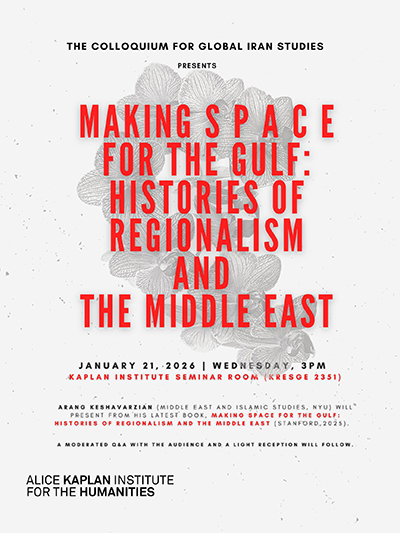 Making Space for the Gulf: Histories of Regionalism and the Middle East
Making Space for the Gulf: Histories of Regionalism and the Middle East
Arang Keshavarzian
Middle East and Islamic Studies, NYU
January 21, 2026
3:00 pm
Kresge #2351 (Kaplan Institute seminar room)
Dr. Keshavarzian will present from his latest book, Making Space for the Gulf: Histories of Regionalism and the Middle East (Stanford, 2025), winner of the 2025 Roger Owen Book Award, sponsored by the Middle East Studies Association (MESA). A moderated Q&A with the audience and a light reception will follow.
Filmic Archive, National Memory, and Iran-Iraq War Movies
Minoo Moallem
Gender and Women's Studies, UC Berkeley
April 8, 2026
3:00 pm
Kresge #2351 (Kaplan Institute seminar room)
Past events - 2025-2026
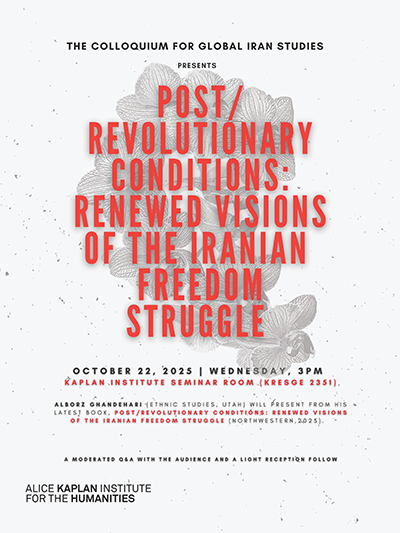 Post/Revolutionary Conditions: Renewed Visions of the Iranian Freedom Struggle
Post/Revolutionary Conditions: Renewed Visions of the Iranian Freedom Struggle
Alborz Ghandehari
Ethnic Studies, University of Utah
October 22, 2025
3:00 pm
Kresge #2351 (Kaplan Institute seminar room)
Dr. Ghandehari will present from his latest book, Post/Revolutionary Conditions: Renewed Visions of the Iranian Freedom Struggle (Northwestern University Press, 2025). A moderated Q&A with the audience and a light reception will follow.
Past events - 2024-2025
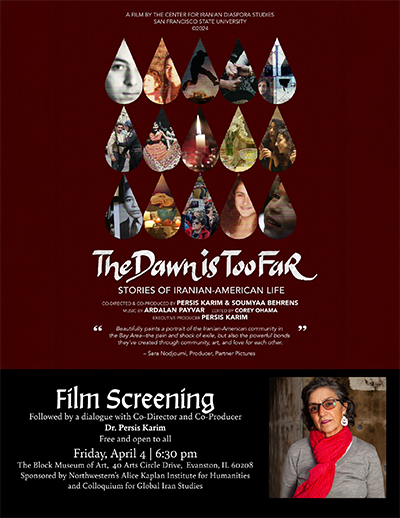 A Dawn is Too Far: Stories of Iranian-American Life
A Dawn is Too Far: Stories of Iranian-American Life
Fri., April 4, 2025
6:30 pm
Block Museum of Art (40 Arts Circle Drive)
Free and open to the public.
Film screening followed by dialogue with co-director and co-producer Dr. Persis Karim, moderated by Dr. Shirin Vossoughi (Associate Professor, Learning Sciences).
This 55-minute poetic documentary features stories about individuals in the San Francisco Bay Area Iranian-American community. It narrates a longer arc of history that begins with the arrival of Iranians as students in the early 1960s, their participation in social and artistic movements, and their contributions to the communities where they live and work. THE DAWN IS TOO FAR tells the larger history of US-Iran relations through themes of exile, alienation, and separation, particularly in the context of the 1979 revolution and hostage crisis, but also more recent events like the 2017 "Muslim Ban." Told by firsthand participants, the film highlights resilience, fortitude, and ways of finding belonging and redefining "home."
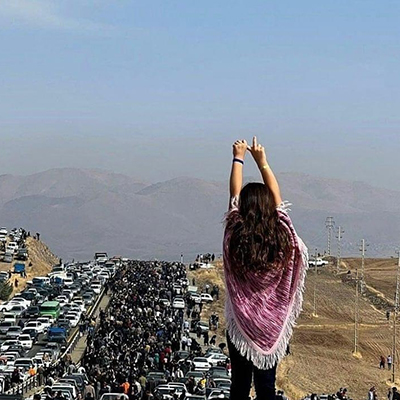 Women Life Freedom: A Transnational Feminist Dialogue on Social Movements and Solidarities
Women Life Freedom: A Transnational Feminist Dialogue on Social Movements and Solidarities
Thurs., October 24, 2024
2:00 - 6:00 pm
1800 Sherman Ave., Room 3029 (Buffett Institute space)
This dialogue brings together feminist scholars and social activists from Iran and the United States to think together about progressive social movements and solidarities across global contexts. The impetus for this event emerged following the 2022 uprisings in Iran, which took shape under the Kurdish slogan “Jin Jian Azadi,” or “Women Life Freedom.” This women-led uprising reverberated around the globe and represents an important movement against intersecting structures of oppression in the Iranian context, including hetero-patriarchy, ethnic supremacy, political repression and theocratic dictatorship. The conditions that led to this movement are ongoing, as are forms of resistance and movement building. There are several important lessons these uprisings hold for feminist social movements around the world. At the same time, the Women Life Freedom movement has much to learn from social and feminist struggles around the world working to disrupt and transform settler-colonial, cis-hetero patriarchal and white supremacist systems.
Hosted by the Colloquium for Global Iran Studies at the Alice Kaplan Institute for the Humanities and co-sponsored by the Buffett Institute for Global Affairs, this three-panel dialogue is a historic and bilingual gathering open in person and online to the Northwestern community and broader public that brings together panelists Parvin Ardalan, Alborz Ghandehari, Firoozeh Farvardin, Zeina Zaatari, Moya Bailey and Erica Meiners, and is moderated by Elham Hoominfar and Shirin Vossoughi.
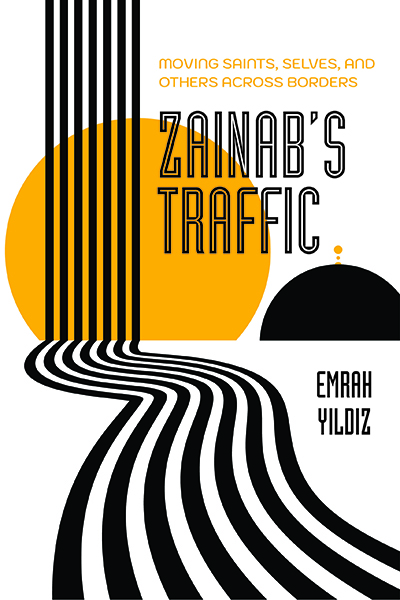 Book Launch Event:
Book Launch Event:
Zainab's Traffic: Moving Saints, Selves, and Others Across Borders by Emrah Yıldız (Anthropology & MENA Studies)
Wed., October 30, 2024
3:00 - 5:30 pm CT
1800 Sherman Ave. #3029, Evanston
Emrah Yıldız (Anthropology & MENA Studies) will read from Zainab's Traffic, followed by a three-way conversation with Alireza Doostdar (University of Chicago) and Angie Heo (University of Chicago) about the book. After a Q&A with the audience, a reception will follow.
About Zainab’s Traffic: Moving Saints, Selves, and Others Across Borders
What is the value—religious, political, economic, or altogether social—of getting on a bus in Tehran to embark on an eight-hundred-mile journey across two international borders to the Sayyida Zainab shrine outside Damascus? Under what material conditions can such values be established, reassessed, or transgressed, and by whom? Zainab’s Traffic provides answers to these questions alongside the socially embedded—and spatially generative—encounters of ritual, mobility, desire, genealogy, and patronage along the route. Whether it is through the study of the spatial politics of saint veneration in Islam, analysis of cross-border gold trade and sanctions, or examination of pilgrims women’s desire for Syrian lingerie accompanying their pleas with the saint in marital matters, the book and this talk develops the idea of visitation as a ritual of mobility across geography, history, and category. Iranian visitors’ experiences on the road to Sayyida Zainab—emerging out of a self-described “poverty of mobility”—demonstrate the utility of a more capacious anthropological understanding of ritual than our current predicaments allow for. Rather than thinking of ritual as a scripturally canonized manual for pious self-cultivation, Zainab’s Traffic approaches ziyarat as a traffic of pilgrims, goods, and ideas across Iran, Turkey, and Syria.
Past Events - 2023-2024
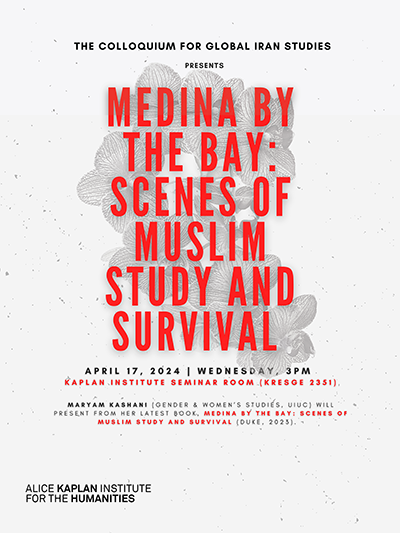
Medina by the Bay: Scenes of Muslim Study and Survival
Dr. Maryam Kashani
Gender and Women's Studies, University of Illinois Urbana-Champaign
Wed., April 17, 2024
3:00 pm
Kresge #2-351 (Kaplan Institute seminar room)
Dr. Kashani will present from her recent book, Medina by the Bay: Scenes of Muslim Study and Survival (Duke, 2023).
PAST EVENTS 2023-2024
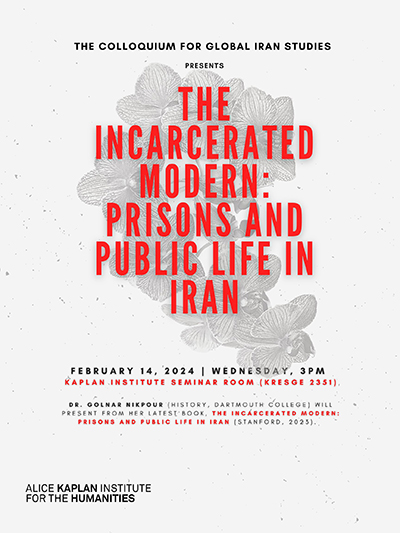 The Incarcerated Modern: Prisons and Public Life in Iran
The Incarcerated Modern: Prisons and Public Life in Iran
Dr. Golnar Nikpour
History, Dartmouth College
Wed., February 14, 2024
3:00 pm
Kresge #2-351 (Kaplan Institute seminar room)
Dr. Nikpour will present from her latest book, The Incarcerated Modern: Prisons and Public Life in Iran (Stanford, 2023).
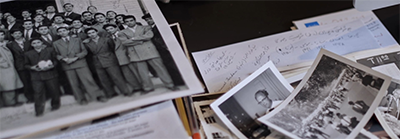 Alborz, We Climb Mountains (2023)
Alborz, We Climb Mountains (2023)
Screening and Conversation
Thurs., January 25, 2024
6:30 pm
Block Museum of Art (40 Arts Circle Drive)
Free and open to the public
Join us for a film screening and discussion with filmmaker Maryam Sepehri in conversation with Dr. Mahdi Ganjavi. Film is in Persian with English subtitles. Discussion will be in English and Persian. Click here to read guest speaker bios.
ALBORZ, WE CLIMB MOUNTAINS (2023, 86 min), tells the story of Alborz high school during many tumultuous years in Iran’s modern history, from the perspectives of its graduates and teachers, as well as famed Iranian educator Dr. Mohammad-Ali Mojtahedi’s own voice from archival recordings; it tells it with humor, fondness, and nostalgia for a bygone era. It exemplifies what has been lost in the years since the 1979 Revolution and why today so many among the bright and promising young Iranians sound critical of current policies and administrative mishandling of one of their country's once top educational institutions. Watch the film trailer here.
Organized by the Northwestern University Colloquium for Global Iran Studies (CoGIS), and co-sponsored by the Alice Kaplan Institute for the Humanities and the School of Education and Social Policy.
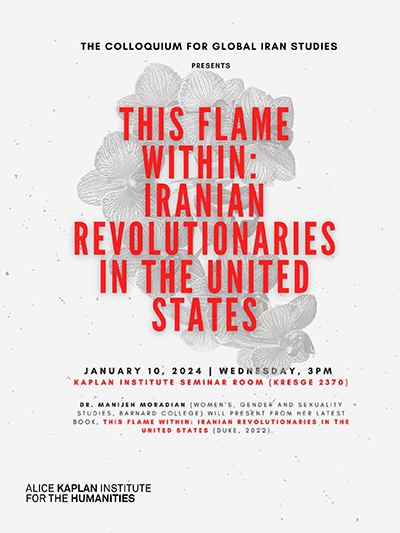 This Flame Within: Iranian Revolutionaries in the United States
This Flame Within: Iranian Revolutionaries in the United States
Dr. Manijeh Moradian
Women's, Gender and Sexuality Studies, Barnard College
Wed., January 10, 2024
3:00 pm
Kresge #2-351 (Kaplan Institute seminar room)
Dr. Moradian will present from her latest book, This Flame Within: Iranian Revolutionaries in the United States (Duke, 2022).
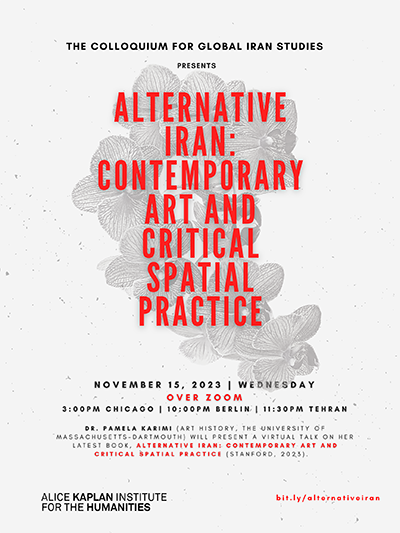 Alternative Iran: Contemporary Art and Critical Spatial Practice
Alternative Iran: Contemporary Art and Critical Spatial Practice
Dr. Pamela Karimi
Art History, The University of Massachusetts-Dartmouth
Wed., November 15, 2023
3:00 pm CT
Via Zoom: bit.ly/alternativeiran
Dr. Karimi will present a virtual talk on her latest book, Alternative Iran: Contemporary Art and Critical Spatial Practice (Stanford, 2023).
Past events - 2022-2023
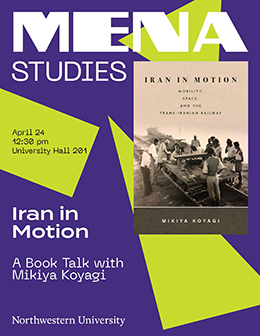 Book Talk: Iran in Motion - Mikiya Koyagi (University of Texas at Austin)
Book Talk: Iran in Motion - Mikiya Koyagi (University of Texas at Austin)
April 24, 2023
12:30 - 2:00 pm (Lunch will be served)
University Hall #201
Co-presented with the Middle East and North African Studies Program as part of their MENA Mondays series.
Completed in 1938, the Trans-Iranian Railway connected the Caspian Sea and the Persian Gulf. Drawing on newspapers, industry publications, travelogues, and memoirs, as well as American, British, Danish, and Iranian archival materials, Mikiya Koyagi traces contested imaginations and practices of mobility from the conception of a trans-Iranian railway project during the nineteenth century to its early years of operation on the eve of Iran's oil nationalization movement in the 1950s. He considers how the infrastructural megaproject reoriented the flow of people and goods, and reshaped the relationship of the provinces to Tehran.
Mikiya Koyagi is Assistant Professor of Middle Eastern Studies at the University of Texas at Austin. He is a historian of the modern Middle East, with an emphasis on the social and cultural history of nineteenth and twentieth century Iran. His first book, Iran in Motion, received the 2022 Saidi-Sirjani Book Award.
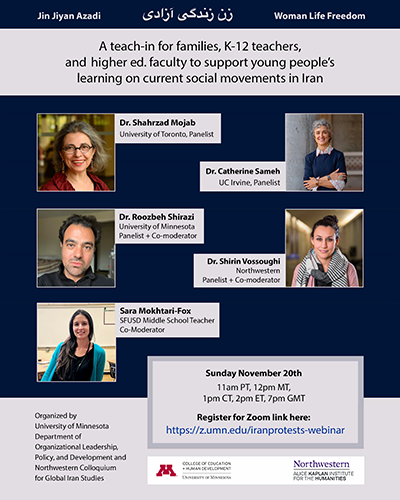 Women, Life, Freedom: Iran Webinar for Educators, Families, and Youth
Women, Life, Freedom: Iran Webinar for Educators, Families, and Youth
November 20, 2022
1:00 - 2:00 pm CT
Via Zoom
A teach-in for families, K-12 teachers, and higher education faculty to support young people's learning on current social movements in Iran. Organized by the University of Minnesota Department of Organizational Leadership, Policy, and Development and Northwestern's Colloquium for Global Iran Studies.
Co-Moderator and Panelist: Associate Professor Shirin Vossoughi (School of Education and Social Policy, Northwestern)
Co-Moderator: Sara Mokhtari-Fox (SFUSD Middle School Teacher)
Panelists: Dr. Shahrzad Mojab (Univ. of Toronto); Dr. Catherine Sameh (UC Irvine), Dr. Roozbeh Shirazi (Univ. of Minnesota)
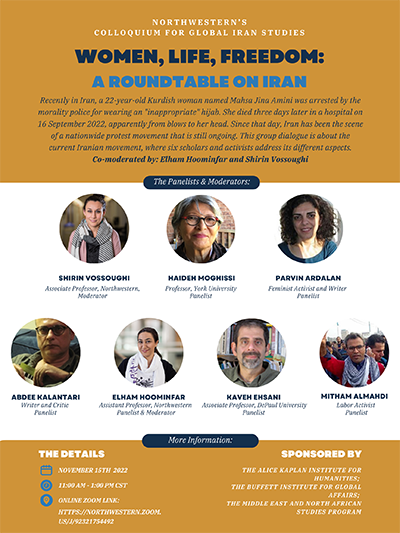 Women, Life, Freedom: A Roundtable on Iran
Women, Life, Freedom: A Roundtable on Iran
November 15, 2022
11:00 am - 1:00 pm CT
Via Zoom
Co-sponsored by the Alice Kaplan Institute for the Humanities, the Middle East and North African Studies Program, and the Roberta Buffett Institute for Global Affairs.
Recently in Iran, a 22-year-old Kurdish woman named Mahsa Jina Amini was arrested by the morality police for wearing an "inappropriate" hijab. She died three days later in a hospital on 16 September 2022, apparently from blows to her head. Since that day, Iran has been the scene of a nationwide protest movement that is still ongoing. This group dialogue is about the current Iranian movement, where six scholars and activists address its different aspects.
Featuring:
Mitham Almahdi (Labor Activist); Parvin Ardalan (Feminist Activist and Writer); Kaveh Ehsani (Associate Professor, DePaul University); Elham Hoominfar (Assistant Professor, Northwestern); Abdee Kalantari (Writer and Critic); Haideh Moghissi (Professor, York University); and Shirin Vossoughi (Associate Professor, School of Education and Social Policy, Northwestern)
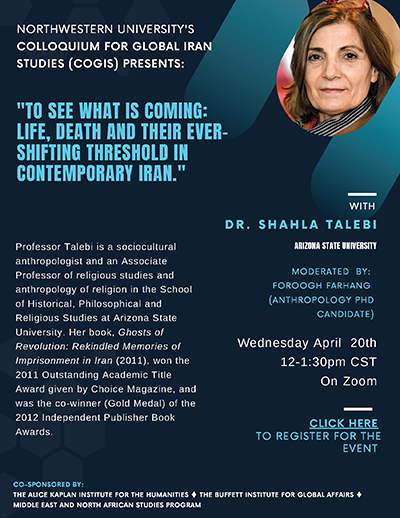 To See What Is Coming: Life, Death and their Ever-shifting Threshold In Contemporary Iran
To See What Is Coming: Life, Death and their Ever-shifting Threshold In Contemporary Iran
Dr. Shahla Talebi (Arizona State Univ.)
April 20, 2022
12:00 - 1:30 pm CT
Via Zoom
Co-sponsored by the Alice Kaplan Institute for the Humanities, the Roberta Buffet Institute for Global Affairs, and the Middle East and North African Studies Program.
Moderated by Foroogh Farhang, PhD Candidate in Anthropology at Northwestern.
Dr. Talebi is a sociocultural anthropologist and Associate Professor of Religious Studies and Anthropology of Religion in the School of Historical, Philosophical, and Religious Studies at Arizona State University. Her book, Ghosts of Revolution: Rekindled Memories of Imprisonment in Iran (2011), won the 2011 Outstanding Academic Title Award given by Choice Magazine, and was the co-winner (Gold Medal) of the 2012 Independent Publisher Book Awards. Dr. Talebi's work has also appeared in various academic journals and in edited book volumes. Her article on revolutions in recent Iranian history was published in the Oxford Handbook series in July 2018. She was the 2017-2018 Anthony E. Kaye fellow at National Humanities Center where she worked on her book about contested memories of martyrdom in post-revolutionary Iran.
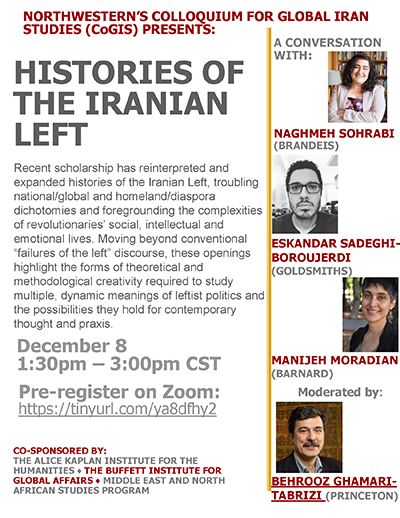 Histories of the Iranian Left—A Conversation
Histories of the Iranian Left—A Conversation
December 8, 2021
1:30 - 3:00 pm CT
Via Zoom
Co-sponsored by the Alice Kaplan Institute for the Humanities, Roberta Buffett Institute for Global Affairs, and Middle East and North African Studies Program.
A conversation with Naghmeh Sohrabi (Brandeis), Eskandar Sadeghi-Boroujerdi (Goldsmiths), and Manijeh Moradian (Barnard). Moderated by Behrooz Ghamari-Tabrizi (Princeton).
Recent scholarship has reinterpreted and expanded histories of the Iranian Left, troubling national/global and homeland/diaspora dichotomies and foregrounding the complexities of revolutionaries' social, intellectual, and emotional lives. Moving beyond conventional "failures of the left" discourse, these openings highlight the forms of theoretical and methodological creativity required to study multiple, dynamic meanings of leftist politics and the possibilities they hold for contemporary thought and praxis.
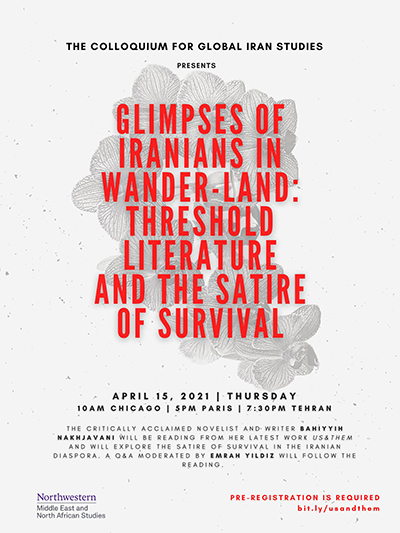 Glimpses of Iranians in Wander-land: Threshold Literature and the Satire of Survival
Glimpses of Iranians in Wander-land: Threshold Literature and the Satire of Survival
April 15, 2021
10:00 - 11:30 am CT
Via Zoom
The critically acclaimed novelist and writer Bahiyyih Nakhjavani will read from her latest work, Us&Them, and will explore the satire of survival in the Iranian diaspora. A moderated Q&A by Emrah Yildiz will follow the reading.
Bahiyyih Nakhjavani was born in Iran, raised in Uganda, and educated in the UK and the United States. She has taught literature and creative writing in a variety of countries and cultures, is the author of non-fiction as well as novels, and has collaborated on adaptations in English of modern Persian poetry over the years. Her latest work Us&Them (2017) is a satire about the Iranian diaspora scattered all over the world. She currently lives in eastern France.
Emrah Yıldız is a cultural anthropologist and Crown Junior Chair in Middle East Studies at Northwestern. He studies religious, economic, and political mobilities—of goods, people, and ideas—across Iran, Turkey, and Syria. Co-editor of the collection “Resistance Everywhere:” The Gezi Protests and Dissident Visions of Turkey (2014), he is a founding steering committee member of the Colloquium for Global Iran Studies.
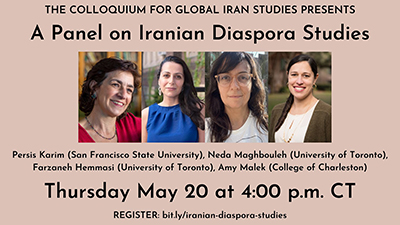 A Panel on Iranian Diaspora Studies
A Panel on Iranian Diaspora Studies
May 20, 2021
4:00 - 5:00 pm CT
Via Zoom
As scholars and educators, we continually trouble the boundaries of Middle East Studies and Asian American Studies, carving out a space to consider transnational histories of empire, migration, assimilation, racism, gender, and sexuality that emerge from U.S. interventions, and popular movements for self-determination, in West Asia. At the same time, we are invested in the frameworks developed in Asian American Studies and other interdisciplinary fields in the humanities, which provide crucial tools for thinking about how Iranian bodies in North America (and Europe) are hyper visible and invisible at the same time, positioned as threatening but also as assimilable, as the ultimate other and as symbols of racial progress and exceptionalism.
We hope to explore the ways in which an interdisciplinary engagement with Asian American Studies and the humanities more broadly has opened new pathways for thinking about Iranian diasporas in research and teaching. How do we change curricula, redefine concepts, add new layers of meaning, and otherwise change the story of who Asian Americans are, how they come to be in North America and what their presence means for politics and culture? What Asian American scholarship has been particularly generative for us and where have we had to innovate and adapt to find concepts and frameworks that work for the populations we study? How do Iranians fit into our picture of the histories of empire, racialization, assimilation, the global division of labor, extractive capitalism, neoliberalism, wars and revolutions—and the gender and sexual politics of racialized identity—that have been major concerns for Asian American Studies?
This panel will attempt to unpack the importance of humanistic inquiry in Iranian diaspora studies.
Panelists
Persis Karim, Neda Nobari Chair of the Center for Iranian Diaspora Studies and Professor of Comparative and World Literature, San Francisco State University
Neda Maghbouleh, Associate Professor of Sociology and Canada Research Chair in Migration, Race, and Identity, University of Toronto
Amy Malek, Assistant Professor of International Studies, College of Charleston, and Associate Research Scholar, Sharmin and Bijan Mossavar-Rahmani Center for Iran and Persian Gulf Studies, Princeton University
Farzaneh Hemmasi, Associate Professor of Ethnomusicology, University of Toronto
Moderator
Ida Yalzadeh, Visiting Assistant Professor in the Asian American Studies Program and Visiting Faculty Affiliate of the MENA Program at Northwestern
